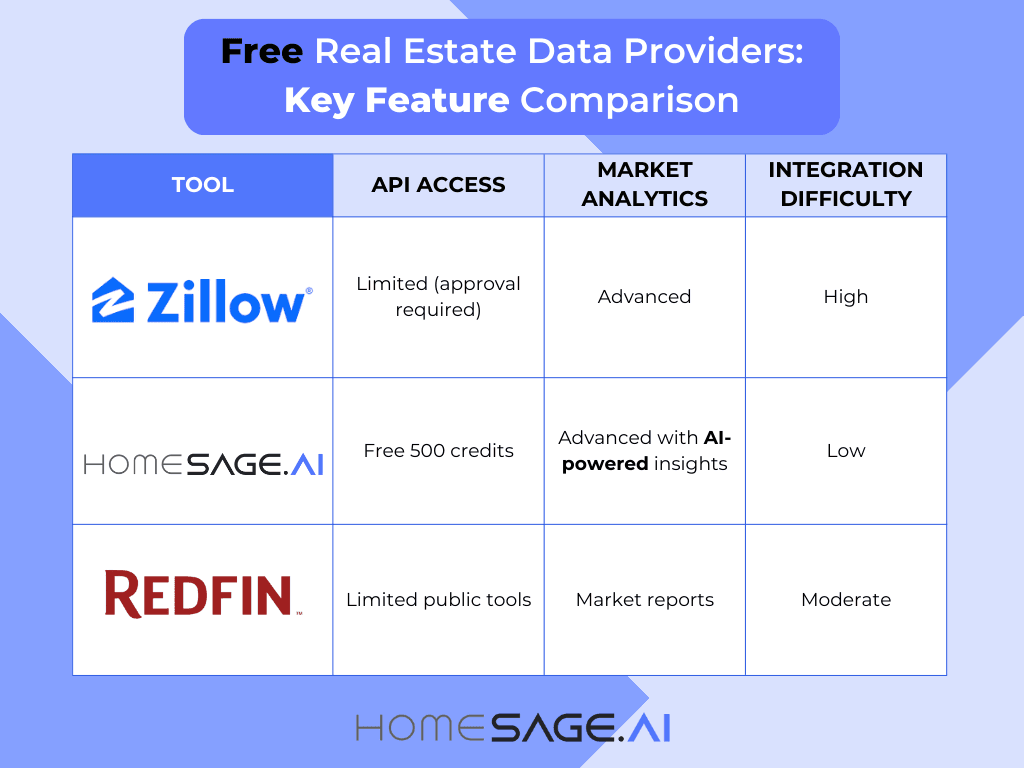Finding reliable free real estate data providers can be challenging, especially when you need comprehensive, accurate, and easily accessible information for your applications or analysis projects.
In 2025, the demand for real estate data has reached new heights, driven by artificial intelligence applications, automated valuation models, and sophisticated property analysis tools.
 Whether you’re building a real estate app, conducting market research, or developing investment strategies, having access to quality property data without breaking the bank is crucial for success.
Whether you’re building a real estate app, conducting market research, or developing investment strategies, having access to quality property data without breaking the bank is crucial for success.
This comprehensive guide examines the three best free real estate data providers available in 2025, analyzing their features, limitations, and practical applications.
We’ll explore how these platforms can support your real estate technology projects while helping you make informed decisions about which provider best suits your specific needs.
Understanding Free Real Estate Data Access
Free real estate data providers offer varying levels of access to property information, market trends, and comparative market analysis. These platforms typically provide basic property details, historical sales data, and market statistics without requiring upfront payment or long-term commitments.
The key to successfully leveraging free real estate data lies in understanding each provider’s limitations, API restrictions, and data coverage areas.
While free tiers may have request limits or reduced feature sets, they offer excellent opportunities for testing, prototyping, and small-scale applications.
Modern free real estate data providers have evolved beyond simple property listings to include sophisticated analytics, AI-powered insights, and developer-friendly APIs. This evolution has made high-quality property data more accessible to startups, independent developers, and small businesses that previously couldn’t afford premium data services. 
1. Zillow: The Market Leader with Complex Access
Zillow remains one of the most recognized names in real estate data, offering extensive property information across the United States.
Their database contains millions of property records, including current listings, historical sales data, Zestimate valuations, and detailed property characteristics.
However, accessing Zillow’s data presents significant challenges due to their complex approval process.
The company has become increasingly restrictive about who can access their API and property data, requiring extensive documentation, business verification, and often rejecting applications that don’t meet their specific criteria.
The approval process typically involves submitting detailed information about your intended use case, demonstrating how you’ll add value to the real estate ecosystem, and proving your technical capability to handle their data responsibly.
This process can take weeks or even months, making it impractical for developers who need immediate access to property data.
Despite these challenges, Zillow’s data quality and coverage remain impressive. Their property database includes detailed information about square footage, lot size, property history, neighborhood statistics, and market trends.
For developers who successfully navigate the approval process, Zillow offers comprehensive data that can power sophisticated real estate applications.
Zillow Pros
- Comprehensive nationwide coverage – Extensive database with millions of property records across all 50 states, providing the most complete property information available
- Rich property details – Includes detailed information about square footage, lot size, property history, tax records, and neighborhood statistics for thorough analysis
- Zestimate integration – Automated property valuations using proprietary algorithms that incorporate local market trends and comparable sales data
- Historical sales data depth – Extensive records of past transactions, price changes, and market trends dating back several years for comprehensive market analysis
- Rental market insights – Comprehensive rental listings with pricing data, market rent estimates, and rental trend analysis across major metropolitan areas
- Market leader credibility – Established reputation and brand recognition in real estate technology with proven data accuracy and reliability
2. Homesage.ai: Developer-Friendly with Free Sandbox Access
Homesage.ai stands out as a modern, AI-powered real estate data provider that prioritizes developer accessibility and ease of use.
Unlike traditional providers with complex approval processes, Homesage.ai offers a free sandbox plan with 500 credits that allows developers to test their data services immediately without lengthy approval procedures.
This developer-friendly approach makes Homesage.ai particularly attractive for PropTech startups, independent developers, and businesses that need to quickly prototype real estate applications.
The free sandbox environment provides access to their comprehensive property database, including current listings, historical sales data, and AI-powered property analysis tools.
The platform’s API documentation is straightforward and well-maintained, making integration simple for developers with varying experience levels. Their data coverage includes detailed property information, market analytics, comparative market analysis, and neighborhood statistics across major metropolitan areas.
Homesage.ai‘s AI-powered features set it apart from traditional data providers. Their platform includes automated property valuation models, investment analysis tools, and market trend predictions that leverage machine learning algorithms. These advanced features are typically available only in premium data services, making their free tier particularly valuable.
The 500-credit free plan provides sufficient access for testing, small applications, and proof-of-concept projects. Developers can evaluate data quality, test API endpoints, and build initial prototypes before committing to paid plans. This approach reduces risk and allows for informed decision-making about long-term data provider relationships.
Customer support for free tier users is responsive and helpful, with technical documentation and integration guides readily available. The platform’s focus on developer experience extends to their billing transparency, clear usage metrics, and straightforward upgrade paths for growing applications.
Homesage.ai pros
- Immediate access – Fast approval process, allowing developers to start testing and integrating within minutes of registration
- Generous free tier – 500 credits in the sandbox plan provide substantial testing capacity for proof-of-concept development and application prototyping
- AI-powered insights – Machine learning algorithms enhance data accuracy and provide intelligent property analysis and market predictions
- Developer-friendly design – Simple API integration with clear documentation, practical examples, and straightforward authentication processes
- Responsive customer support – Active technical assistance for free tier users with helpful integration guidance and troubleshooting support
- Transparent pricing model – Clear credit system and straightforward upgrade paths without hidden fees or complex approval requirements
- Modern API architecture – RESTful design with JSON responses, making integration simple for developers with varying experience levels
- Regular data updates – Frequent refreshes ensure property information remains current and accurate for time-sensitive applications
- Growing market coverage – Expanding geographic reach with particular strength in emerging markets and high-growth metropolitan areas
3. Redfin: Comprehensive Market Data with Public Access
Redfin offers a unique approach to free real estate data access through their public-facing tools and limited API availability.
While they don’t provide the same level of API access as dedicated data providers, Redfin’s market reports, downloadable datasets, and research tools offer valuable insights for real estate analysis.
The platform regularly publishes comprehensive market reports covering housing trends, price movements, and inventory levels across major metropolitan areas.
These reports include detailed statistics, charts, and analysis that can be valuable for market research, investment decisions, and competitive analysis.
Redfin’s data download center provides access to historical housing market data in CSV format, making it easy to import into spreadsheets, databases, or analytical tools. This data includes median sale prices, inventory levels, time on market, and other key metrics that are essential for real estate market analysis.
Their housing market tracker offers real-time insights into market conditions, including new listings, pending sales, and price changes. While this data isn’t available through a traditional API, it provides valuable market intelligence that can inform business decisions and market positioning strategies.
Redfin Pros
- Direct market involvement – Data accuracy benefits from their active participation in real estate transactions as a licensed brokerage
- Free market reports – Regular publication of comprehensive housing market analysis and trend reports across major metropolitan areas
- Downloadable datasets – CSV format data exports for easy integration into spreadsheets, databases, and analytical tools
- No API restrictions – Public data access without rate limits or approval processes for market research and analysis purposes
- Research quality analysis – Professional-level market studies and demographic insights are typically available only through expensive research subscriptions
- Methodology transparency – Clear documentation of data collection and validation processes, helping users understand appropriate use cases
- Strong West Coast coverage – Particularly detailed and accurate data for California, Washington, and Oregon markets, where they have a significant presence
Comparison Table: Free Real Estate Data Providers Features
Feature | Zillow | Homesage.ai | Redfin |
API Access | Limited (approval required) | Free 500 credits | Limited public tools |
Approval Process | Complex, lengthy | Immediate access | No formal process |
Data Coverage | Nationwide | Nationwide | Nationwide |
Property Details | Comprehensive | Comprehensive with AI insights | Basic to moderate |
Historical Data | Extensive | Extensive | Extensive |
Market Analytics | Advanced | Advanced with AI-powered insights | Market reports |
Developer Support | Limited for free users | Responsive support | Documentation only |
Integration Difficulty | High | Low | Moderate |
Data Quality and Reliability Considerations
 When evaluating free real estate data providers, data quality and reliability should be primary considerations. Each provider has different data collection methods, update frequencies, and accuracy standards that can significantly impact your application’s performance and user experience.
When evaluating free real estate data providers, data quality and reliability should be primary considerations. Each provider has different data collection methods, update frequencies, and accuracy standards that can significantly impact your application’s performance and user experience.
Zillow’s data quality is generally high due to their extensive data collection network and verification processes. However, their Zestimate accuracy varies by market and property type, with some areas showing significant discrepancies between estimated and actual sale prices.
Homesage.ai focuses on data accuracy through AI-powered validation and cleaning processes. Their platform combines multiple data sources and uses machine learning algorithms to identify and correct inconsistencies, resulting in reliable property information for supported markets.
Redfin’s data quality benefits from their direct involvement in real estate transactions as a brokerage. Their firsthand market experience provides insights into data accuracy and market conditions that purely data-focused companies might miss.
API Limitations and Usage Considerations
Understanding API limitations is crucial for planning your application architecture and ensuring sustainable data access. Free tiers typically include request limits, reduced feature sets, or geographic restrictions that must be considered during development.
Rate limiting varies significantly among providers, with some offering generous free access while others impose strict daily or monthly limits. Planning your application’s data requirements and caching strategies can help maximize the value of free tier access.
Use Cases and Application Scenarios
Different free real estate data providers excel in various use cases and application scenarios. Understanding these strengths can help you select the most appropriate provider for your specific needs and goals.
Property search applications benefit from comprehensive listing data and detailed property information. Investment analysis tools require historical sales data and market trend information. Market research projects need broad coverage and statistical accuracy.
Monthly API Request Limits by Provider
Provider | Free Tier Limit | Request Type | Reset Period |
Zillow | Varies by approval | Property details | Monthly |
500 credits | Multi-endpoint | Monthly | |
Redfin | Public tools | Data downloads | As needed |
Key Takeaways
- Zillow offers comprehensive data but requires complex approval processes that can take weeks or months, making it unsuitable for developers needing immediate access to real estate information.
- Homesage.ai provides immediate access through their free sandbox plan with 500 credits, making it the most developer-friendly option for testing and prototyping real estate applications.
- Redfin focuses on market research and public data access through downloadable reports and market analysis tools rather than traditional API access.
- Data quality varies among providers, with each offering different strengths in accuracy, coverage, and update frequency that should align with your specific use case requirements.
- Integration complexity differs significantly, with Homesage.ai offering the simplest implementation process while Zillow requires extensive approval documentation and technical verification.
Conclusion
 Selecting the right free real estate data provider depends on your specific needs, technical requirements, and timeline constraints.
Selecting the right free real estate data provider depends on your specific needs, technical requirements, and timeline constraints.
While Zillow offers extensive data coverage, their complex approval process makes them challenging for many developers.
Homesage.ai provides the most accessible entry point with immediate free access, developer-friendly tools and AI-powered platform.
Redfin serves market research needs well through their public data offerings and comprehensive market reports.
For developers and businesses starting their real estate technology journey, beginning with Homesage.ai‘s free sandbox plan offers the best balance of accessibility, features, and data quality. This approach allows for rapid prototyping and testing while maintaining the flexibility to expand or switch providers as your needs evolve.
People Also Ask
Q: What is the most accurate free real estate data API?
A: Homesage.ai currently offers the most accurate free real estate data through their AI-powered validation system and 500-credit sandbox plan.
Their machine learning algorithms help identify and correct data inconsistencies, providing reliable property information for developers and businesses testing real estate applications.
Q: How do I get free access to Zillow property data?
A: Getting free access to Zillow property data requires completing their complex approval process, which involves submitting detailed documentation about your intended use case, business verification, and technical capability demonstration.
The process can take weeks or months, and many applications are rejected based on Zillow’s strict criteria.
Platforms like homesage.ai could shorten this process and be available in minutes.
Q: Are there any completely free real estate APIs with no limits?
A: Most quality real estate data providers impose some limitations on their free tiers to manage costs and prevent abuse.
However, Homesage.ai offers generous free access with 500 monthly credits, while Redfin provides unlimited access to their public market data and downloadable reports, though not through a traditional API format.



